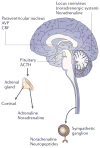The influence of bio-behavioural factors on tumour biology: pathways and mechanisms
- PMID: 16498446
- PMCID: PMC3146042
- DOI: 10.1038/nrc1820
The influence of bio-behavioural factors on tumour biology: pathways and mechanisms
Abstract
Epidemiological studies indicate that stress, chronic depression and lack of social support might serve as risk factors for cancer development and progression. Recent cellular and molecular studies have identified biological processes that could potentially mediate such effects. This review integrates clinical, cellular and molecular studies to provide a mechanistic understanding of the interface between biological and behavioural influences in cancer, and identifies novel behavioural or pharmacological interventions that might help improve cancer outcomes.
Conflict of interest statement
The authors declare no competing financial interests.
Figures



References
-
- Stefanek M, McDonald PG. In: Handbook of Behavioral Science and Cancer. Miller SM, Bowen DJ, Croyle RT, Rowland J, editors. American Psychological Association; Washington DC: in the press.
-
- Reiche EM, Nunes SO, Morimoto HK. Stress, depression, the immune system, and cancer. Lancet Oncol. 2004;5:617–625. - PubMed
-
- Spiegel D, Giese-Davis J. Depression and cancer: mechanisms and disease progression. Biol Psychiatry. 2003;54 :269–282. - PubMed
-
- Price MA, et al. The role of psychosocial factors in the development of breast carcinoma: part I. The cancer prone personality. Cancer. 2001;91:679–685. - PubMed
-
- Lillberg K, et al. Stressful life events and risk of breast cancer in 10,808 women: a cohort study. Am J Epidemiol. 2003;157:415–423. - PubMed
Publication types
MeSH terms
Grants and funding
LinkOut - more resources
Full Text Sources
Medical
Molecular Biology Databases

